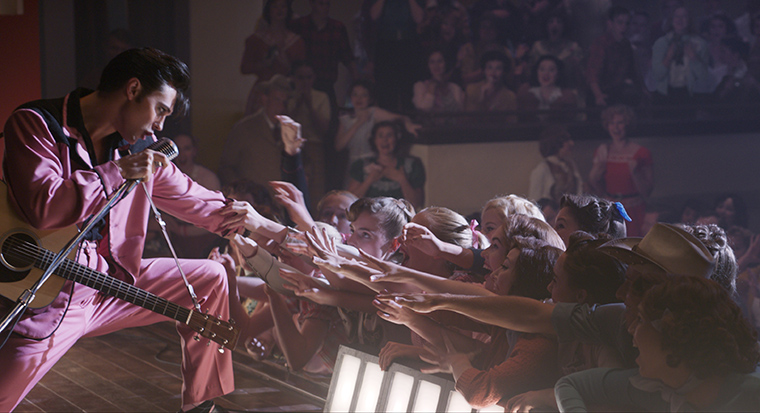
Austin Butler in a scene from "Elvis." (Courtesy of Warner Bros. Pictures. Copyright: © 2022 Warner Bros. Entertainment Inc.)
When you think of Elvis Presley, what comes to mind? Is it the swiveling hips of a rising star from the Deep South? Perhaps a picture of the King of Rock and Roll in his later years, embodying the excesses of his Vegas shows, pops into your head. What is not likely to be the first word you think about is "rebel."
That's because later generations have come to associate Presley with the tourist-friendly trappings of his stage persona: the loud wardrobe, those thick sunglasses. "Thank you, thank you very much," indeed. To put it another way, he has been domesticated. There's a comforting tameness in the way he has been portrayed in popular culture since his passing in 1977 at age 42.
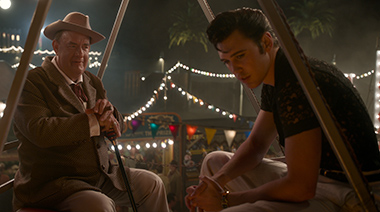
Tom Hanks and Austin Butler in a scene from "Elvis." (Courtesy of Warner Bros. Pictures. Copyright: © 2022 Warner Bros. Entertainment Inc.)
Credit Baz Luhrmann for dusting off the cobwebs and making Presley vibrant again. "Elvis," the Australian auteur's thrillingly kaleidoscopic screen biography of the music icon, reminds you that, before the sideburns and peanut butter and banana sandwiches, there was something visceral about the way Presley connected with an audience. The body language was animalistic, the energy undeniably sexual. He was cool in a way that came from within. The word you're probably looking for is dangerous.
Peril also comes to mind regarding the framing device driving this 159-minute foray into the euphoric highs and paralyzing lows of stardom. Luhrmann, working from a screenplay credited to him, Sam Bromell, Jeremy Doner and longtime collaborator Craig Pearce, mostly tells the story from the point of view of Presley's manager, Colonel Tom Parker. As played by Tom Hanks as a real-life gargoyle, fat suit and all, the opportunistic music entrepreneur from the Netherlands got in on the ground floor after seeing a county fair performance of the boy who would be king and feeling certain he'd found his meal ticket for the long haul.
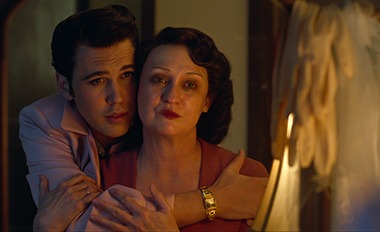
Austin Butler and Helen Thomson in a scene from "Elvis." (Courtesy of Warner Bros. Pictures. Copyright: © 2022 Warner Bros. Entertainment Inc.)
It sounds like a streamlined strategy: focus on the cycle of codependency that allowed Parker to milk his golden cow for decades. But straightforward is rarely in Luhrmann's vocabulary. So he begins "Elvis" on the night Parker suffers a stroke, two decades after the King's death. The film assaults you with delirious, frequently carnivalesque visions that hop across multiple time periods. The sensory overload isn't only reminiscent of Luhrmann's trademark curlicues. (The use of split screens, for instance, gives off "Woodstock" vibes.) It reminded this critic of the way Oliver Stone used montage to stitch together the unsettling imagery in the films he made in the 1990s.
Luhrmann eventually settles into a mostly linear narrative structure, and while the end result is more conventional than the film's baroque start suggests, "Elvis" turns out to be the most cohesive feature he's made since "William Shakespeare's Romeo + Juliet" in 1996. The director's excesses prove to be a compatible match with his larger-than-life subject, and unlike "Moulin Rouge," he's not shoehorning a tragedy into what is otherwise a featherweight postmodern lark.
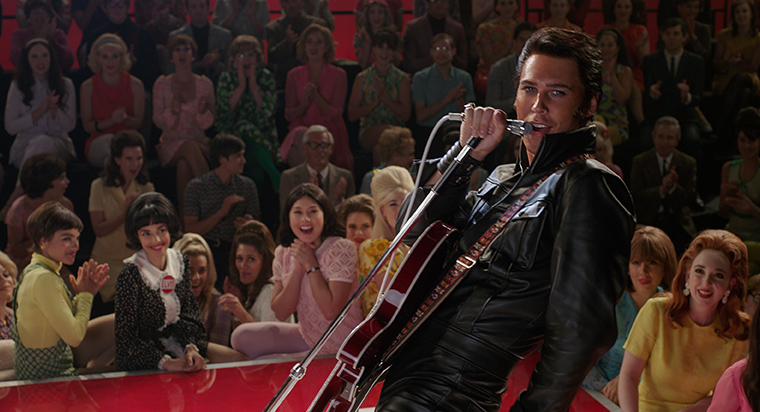
Austin Butler in a scene from "Elvis." (Courtesy of Warner Bros. Pictures. Copyright: © 2022 Warner Bros. Entertainment Inc.)
"Elvis" indulges every fiber of Luhrmann's maximalist impulses, and it would all topple like a house of cards if it weren't for star Austin Butler. Luhrmann's leading man is not a dead ringer for Presley, but the 30-year-old nails the King's magnetism, the primal surge that he displayed when he took command of a stage. The filmmaker rolled the dice by letting Butler sing, but the gamble pays off handsomely. His performance allows viewers to lose themselves in the brashly orchestrated concert sequences, and that's where the film truly comes to life.
Away from the stage, "Elvis" is a more earthbound affair, weighed down by domestic clichés in Luhrmann's depiction of Presley's personal life. His marital troubles and his mother's alcoholism, in particular, are astonishingly by the numbers. The movie is all too aware that fans are expecting a comprehensive portrait, but it could have shaved off some of these biopic-of-the-week trappings and be all the more vital and fleet-footed for it.
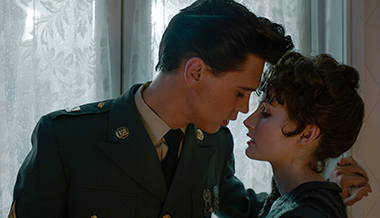
Austin Butler and Olivia DeJonge in a scene from "Elvis." (Courtesy of Warner Bros. Pictures. Copyright: © 2022 Warner Bros. Entertainment Inc.)
What compensates for the film's more mundane aspects is Luhrmann's insistence in striking a parallel between the persecution Presley faced for his "immoral" and "depraved" on-stage movements and the virulent racism that coursed like a poisonous stream across the heartland. Queer culture is also well represented, not only in an inspired moment when a boy feels certain stirrings when seeing Presley on TV, but in the way it lets Little Richard (Alton Mason) be Little Richard to the max.
The clash between the forces of repression and artistic freedom is herein depicted as a microcosm of American society. Kudos to production designers Catherine Martin (Luhrmann's partner in art and in life) and Karen Murphy for rising up to the challenge of capturing multiple time periods and settings with colorful brio, as well as the film's extensive music department for making the classics feel fresh. (Luhrmann even inserts some hip-hop into the mix, an anachronistic flourish he tried out in "The Great Gatsby.")
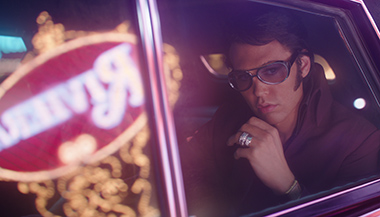
Austin Butler in a scene from "Elvis." (Courtesy of Warner Bros. Pictures. Copyright: © 2022 Warner Bros. Entertainment Inc.)
In its mix of show business and politics, "Elvis" gets right what "Being the Ricardos," Aaron Sorkin's self-important Lucille Ball and Desi Arnaz biopic, got so spectacularly wrong. Of Luhrmann's films since he made a splash in the early 1990s with "Strictly Ballroom," this one feels closest in spirit with that delightful debut feature. He's coming full circle in more ways that one. "Elvis" is awash in circular motifs. Fame, after all, is a wheel. Round and round it goes.
And caught in a trap are a born entertainer in a gilded cage and the lion tamer holding the keys to the kingdom. Hmm. A musical prodigy and an older figure exploiting him for self-serving ends. If that dysfunctional dynamic sounds familiar, it's no accident: Luhrmann has made his very own "Amadeus." The fashions may be different from the 18th century, but the jealousy and lust for power are pretty timeless. It bursts at the seams with Fat Elvis energy, and it's appropriately more than a bit round at the edges. It also shows Luhrmann continuing to swing for the fences. His "Elvis" captures the enormity of this pop culture phenomenon, with enough chutzpah to overcome the bumps in the road.
"Elvis" is now playing in wide release across South Florida, including Dolby Cinema engagements at AMC Aventura, AMC Sunset Place and AMC Pembroke Lakes.




